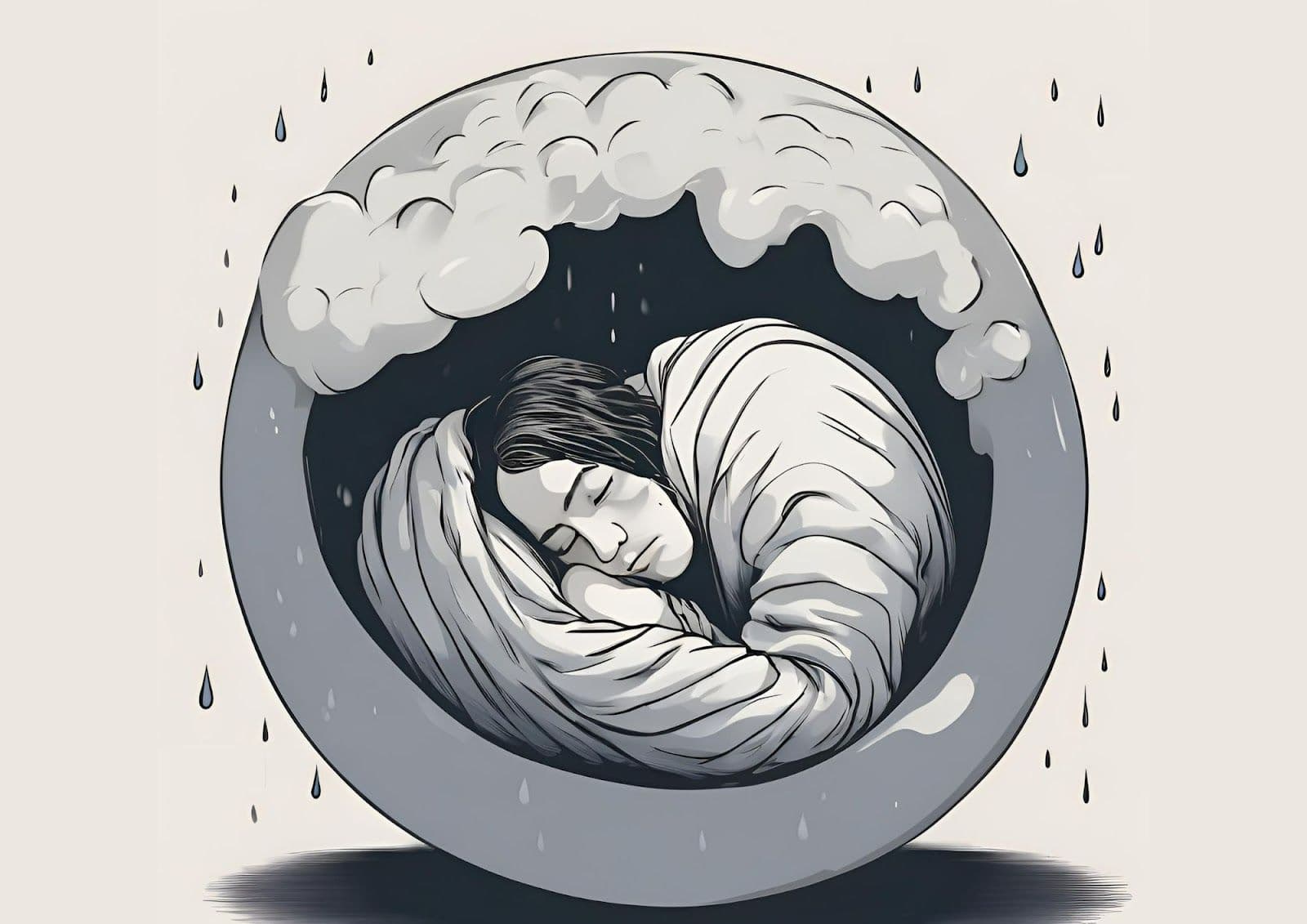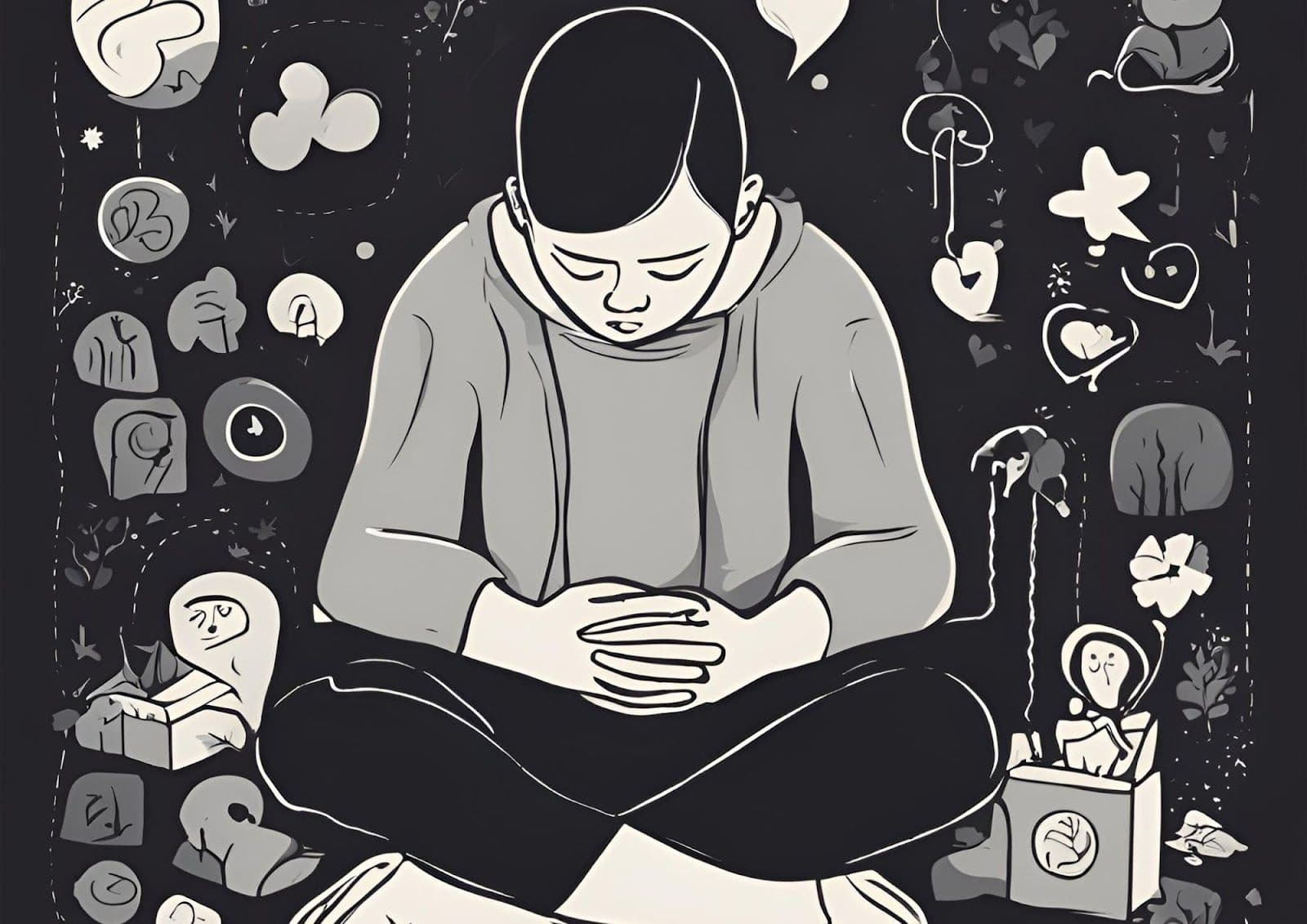I like to think of sadness as an umbrella term for a few uncomfortable emotions. It can serve as a quick way to describe a type of music genre, such as sad girl pop, or can be used as slang to describe an unfortunate situation. However, when we really break it down and get specific with our emotions, we begin to realize that it is not just sadness that we may be feeling but something much more complex, such as grief or depression.
What is the Difference Between Grief and Loss?
When we think of grief, we may often think of death, and while this is the most common association, grief can also arise from any significant loss, such as the end of a relationship, job, or a major life transition. The loss of any of these things is definitely a path toward grief. However, grief can also show up in less obvious ways. As humans, we often fantasize and dream of situations, relationships, or people that have not happened and will probably never happen. We may fantasize about a new crush and see the entire relationship unfold, only to later realize they aren’t the perfect person we’ve made up in our head, therefore undergoing a grieving process for what seemed so enticing to what could never be.
Like many other complicated emotions, grief can be broken down into a wide range of emotions, thoughts, and behaviours. It is a deeply personal experience that varies from individual to individual.
Normal Grief vs. Complicated Grief
When we have found ourselves under the influence of grief, it is completely normal to feel sad, numb or lost for a while. Most people experience these uncomfortable emotions, which, although painful, gradually ease over time, otherwise known as normal grief. However, some individuals may develop complicated grief, a prolonged form of intense grief that interferes with daily functioning and becomes unhealthy. Unlike normal grief, complicated grief can increase the risk of developing depression and other mental health issues.
People with complicated grief may:
- Be unable to comprehend or accept the loss
- Experience intense sorrow and emotional pain
- Have trouble resuming their own life and making positive plans for the future
- Have overwhelmingly negative emotions
- Feel preoccupied with the person who died or the circumstances of the death
- Be unable to find meaning or a purpose in life
If not brought to attention, complicated grief can become serious; therefore, seeking support and understanding early on is almost integral.

Depression After Loss
Depression isn’t just another emotion to describe how we’re feeling. Depression is a serious mood disorder that can significantly impact our daily life functions. Although grief and depression aren’t always linked, recognizing symptoms of depression can help you find treatment, especially when thoughts of “life not being worth living” come into play.
Symptoms of Depression
Suppose you experience these symptoms for most of the day, almost every day. In that case, you may be going through a depressive episode.
- Persistent sadness, emptiness, or hopelessness
- Irritability or anger, even over minor issues
- Loss of interest in previously enjoyable activities
- Sleep disturbances (insomnia or oversleeping)
- Fatigue and lack of energy
- Changes in appetite and weight
- Anxiety, agitation, or restlessness
- Slowed thinking and movements
- Feelings of worthlessness or excessive guilt
- Difficulty concentrating and making decisions
- Recurrent thoughts of death or suicide
- Unexplained physical problems
Differentiating Between Grief and Depression
While depression and grief share some common features, such as intense sadness and social withdrawal, they differ in several key aspects. One of the most easily recognizable distinctions is how we perceive ourselves. When we feel depression, we may indulge in self-loathing and feel a great loss of self-esteem, which is not typically present when we experience grief. In contrast, individuals who are grieving may experience positive emotions and happy memories alongside their pain, while those with depression are characterized by a constant and often unbearable sadness. Grief tends to manifest in waves, with feelings fluctuating over time, while depressive symptoms are more constant and persistent. Therefore, those grieving can often continue engaging in daily activities, sometimes using work or school as a way to distract their minds from the pain. Depression is the opposite, interfering with work productivity, relationships, and the ability to do daily tasks.

Common Types of Major Life Events Leading to Depression
As we grow older, we may adopt the motto that “life is hard,” as there are never-ending factors and scenarios that can cause us to stress out and give up on life. While some life stressors, such as a move, a career switch, or a big work project, are manageable and temporary, others, such as death, divorce, or illness, maybe a lot harder to cope with. Recognizing and understanding these major life changes can hopefully humanize these experiences and bring a sense of sympathy if you or someone you know are going through these changes.
Serious Events Related to a Loved One
- This can be a serious illness, assault, injury to or loss of a spouse, child, parent, or close friend. This profound sense of loss and the need to adjust to a new life can trigger depression.
Divorce or Relationship Problems
- The end of a significant relationship can lead to feelings of failure, loneliness, and uncertainty about the future. These emotions, coupled with the practical challenges of separation, can contribute to the development of depression.
Work-Related or Financial Problems
- Losing a job or experiencing a major career setback can impact one’s sense of identity, financial security, and self-worth.
Personal Problems
- Being diagnosed with a chronic illness or experiencing a disabling injury can dramatically alter one’s life trajectory. The physical challenges and the emotional impact of adjusting to a new reality can be challenging to adapt to.
These stressful experiences can certainly be the cause of major depression. However, every person’s susceptibility to depression can also be based on how vulnerable they are, their family history, and their overall lifestyle.
What Are Some Strategies to Cope With Depression After Loss?
Everyone has their unique way of coping with difficult situations; while some methods may not be the healthiest, approaching depression with acceptance and patience through the phases can open one’s mind to tackling depression in a variety of ways.
Now, I don’t want this article to be another list of methods and ways to heal your depression, as it can be extremely difficult to do anything, let alone read an article. However, suppose you can identify one of these methods and choose a strategy that feels easiest to implement. In that case, you can begin to lift yourself out of that depressive fog. I assure you that even the smallest step can make a significant difference.
Natural Remedies and Lifestyle Tips
Exercise
- While this may seem like an obvious one, those with depression often struggle to get out of bed some days. Therefore, aiming for at least 30 minutes of physical activity 3 to 5 days a week can increase your body’s production of endorphins and naturally improve your mood.
Avoid alcohol and substance use
- Addictive substances are not always easy to give up. Although drinking alcohol or misusing substances may make you feel better in the moment, in the long run, these substances can make depression and anxiety symptoms much worse. Especially since alcohol is a depressant, slowing down your basic functions.
Prioritise self-care
- Surprisingly, taking care of yourself is often a difficult task for some individuals. Prioritizing self-care means getting plenty of sleep, eating a healthy diet, setting boundaries to avoid negative people or experiences, and participating in enjoyable hobbies and activities.
Supplements
- While it is important to take your daily vitamins, some supplements can help lower symptoms of depression. Before taking new supplements, make sure to talk to your doctor or healthcare team, as some supplements can have significant side effects or interact with certain medications.
5-hydroxytryptophan (5-HTP)
- 5-HTP is a naturally occurring amino acid and chemical precursor to serotonin, a neurotransmitter that helps regulate your mood. When consumed, 5-HTP can cross the blood-brain barrier and potentially increase serotonin levels in the brain, therefore easing symptoms of depression.
Omega-3 fatty acids
- These essential fats, particularly EPA (eicosapentaenoic acid) and DHA (docosahexaenoic acid), are believed to have anti-inflammatory properties that may influence neurotransmitter function and therefore soothe depression symptoms.
Psychotherapy
In addition to traditional psychotherapy for depression, at AEM, we offer innovative approaches such as:
Ketamine therapy for depression
- This cutting-edge treatment has shown remarkable results in alleviating symptoms and providing relief for individuals struggling with treatment-resistant depression. Our experts will explore all available options to ensure you receive the most effective and personalized care. You can book a consultation call to see if Ketamine treatment is right for you.
Group counselling for depression
- Connecting with others who share similar experiences can mirror your internal world and offer a unique way of being seen that is invaluable in the journey toward healing. If you are interested in this, please talk to one of our therapists about being added to the waitlist.

Finding Meaning and Purpose After Loss
Major life events, especially those involving significant loss, often necessitate a redefinition of our sense of self. This process of redefining one’s identity is often the most daunting part of grief, as we can find ourselves lost in a sea of questions. While this can be both challenging and transformative, it may allow you to explore new interests, take on different roles, and form new relationships. As we navigate this journey of self-discovery, we begin to understand that our identity is not static but evolves with our experiences.
An essential part of moving forward after a significant loss is setting new goals. These objectives provide a sense of direction and purpose, acting as a compass in the sometimes turbulent waters of grief and recovery. Such goals might relate to personal growth, like developing new skills or habits. They could also involve career aspirations, such as changing professions or pursuing further education. Additionally, many find solace in goals that contribute to their community, allowing them to channel their experiences into ones they find meaningful.
Whether you’re grieving the death of a loved one or the closing of a long-term relationship, giving yourself compassion and patience and honouring your memories can be a powerful part of the healing process. Life after loss may look different, but it can still be deeply meaningful. By acknowledging your emotions, seeking support, and prioritizing your mental health, you can gradually rebuild your life while keeping the memory of your loved ones alive. The path to healing isn’t always straightforward, but with persistence, self-compassion, and a willingness to honour both your past and your future, you can create a new chapter filled with hope, purpose, and even joy. Remember, your journey is unique, and there’s no right or wrong way to grieve or heal – At An Elegant Mind, we are dedicated to making sure you find a path that feels right for you.
References
Coping with Grief and Loss | National Institute on Aging, www.nia.nih.gov/health/grief-and-mourning/coping-grief-and-loss. Accessed 23 Sept. 2024.
“Depression (Major Depressive Disorder).” Mayo Clinic, Mayo Foundation for Medical Education and Research, 14 Oct. 2022, www.mayoclinic.org/diseases-conditions/depression/symptoms-causes/syc-20356007.
Nall, Rachel. “Depression after the Death of a Loved One.” Healthline, Healthline Media, 8 Dec. 2017, www.healthline.com/health/depression/death-loved-one#grief-vs-depression.
Stegenga, Bauke T, et al. “Recent Life Events Pose Greatest Risk for Onset of Major Depressive Disorder during Mid-Life.” Journal of Affective Disorders, U.S. National Library of Medicine, Feb. 2012, www.ncbi.nlm.nih.gov/pmc/articles/PMC3657156/.

